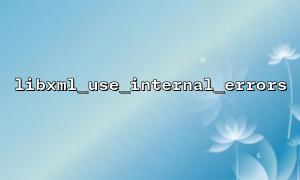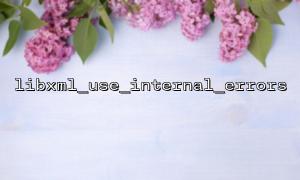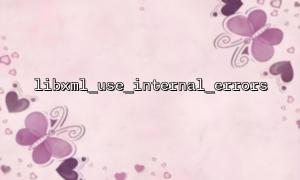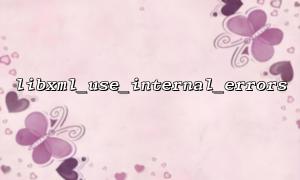When working with XML files in PHP, parsing errors are common—particularly when the XML structure is incomplete or improperly formatted. By default, the libxml extension outputs these errors directly, which can clutter the display or even reveal sensitive information. To handle such errors more elegantly, PHP provides the libxml_use_internal_errors function, allowing developers to capture errors internally rather than letting them output immediately. This enables more flexible error handling.
This article details how to use the libxml_use_internal_errors function, with sample code demonstrating how to catch and process XML parsing errors in real-world development scenarios.
libxml_use_internal_errors is a PHP function that enables or disables libxml’s internal error handling mechanism. When enabled, libxml does not output errors directly; instead, it stores them, allowing your application to fetch and handle them using other functions.
Function prototype:
bool libxml_use_internal_errors ([ bool $use_errors = true ] )
Parameter $use_errors: Indicates whether to enable internal error handling. Defaults to true.
Return value: The previous internal error handling state (a boolean).
By default, if XML parsing fails, errors are printed directly to the screen, potentially breaking layout or offering no fine-grained control over the error output.
After calling libxml_use_internal_errors(true), these errors are suppressed and cached internally. You can retrieve the error list using libxml_get_errors() and handle them as needed—for example, by logging or formatting the output.
The following example shows how to use libxml_use_internal_errors to parse an XML string and capture parsing errors if any occur:
<?php
// Enable libxml internal error handling
libxml_use_internal_errors(true);
<p>// Malformed XML string<br>
$xmlString = <<<XML<br>
<root><br>
<item>Example</item<br>
</root><br>
XML;</p>
<p>// Create a new DOMDocument instance<br>
$doc = new DOMDocument();</p>
<p>// Attempt to load the XML string<br>
if (!$doc->loadXML($xmlString)) {<br>
echo "XML parsing failed. Error details below:<br>";</p>
<pre class="overflow-visible!"><div class="contain-inline-size rounded-2xl border-[0.5px] border-token-border-medium relative bg-token-sidebar-surface-primary"><div class="flex items-center text-token-text-secondary px-4 py-2 text-xs font-sans justify-between h-9 bg-token-sidebar-surface-primary dark:bg-token-main-surface-secondary select-none rounded-t-2xl">php</div><div class="sticky top-9"><div class="absolute end-0 bottom-0 flex h-9 items-center pe-2"><div class="bg-token-sidebar-surface-primary text-token-text-secondary dark:bg-token-main-surface-secondary flex items-center gap-4 rounded-sm px-2 font-sans text-xs"><button class="flex gap-1 items-center select-none py-1" aria-label="复制"><svg width="24" height="24" viewBox="0 0 24 24" fill="none" xmlns="http://www.w3.org/2000/svg" class="icon-xs"><path fill-rule="evenodd" clip-rule="evenodd" d="M7 5C7 3.34315 8.34315 2 10 2H19C20.6569 2 22 3.34315 22 5V14C22 15.6569 20.6569 17 19 17H17V19C17 20.6569 15.6569 22 14 22H5C3.34315 22 2 20.6569 2 19V10C2 8.34315 3.34315 7 5 7H7V5ZM9 7H14C15.6569 7 17 8.34315 17 10V15H19C19.5523 15 20 14.5523 20 14V5C20 4.44772 19.5523 4 19 4H10C9.44772 4 9 4.44772 9 5V7ZM5 9C4.44772 9 4 9.44772 4 10V19C4 19.5523 4.44772 20 5 20H14C14.5523 20 15 19.5523 15 19V10C15 9.44772 14.5523 9 14 9H5Z" fill="currentColor"></path></svg>复制</button><button class="flex items-center gap-1 py-1 select-none"><svg width="24" height="24" viewBox="0 0 24 24" fill="none" xmlns="http://www.w3.org/2000/svg" class="icon-xs"><path d="M2.5 5.5C4.3 5.2 5.2 4 5.5 2.5C5.8 4 6.7 5.2 8.5 5.5C6.7 5.8 5.8 7 5.5 8.5C5.2 7 4.3 5.8 2.5 5.5Z" fill="currentColor" stroke="currentColor" stroke-linecap="round" stroke-linejoin="round"></path><path d="M5.66282 16.5231L5.18413 19.3952C5.12203 19.7678 5.09098 19.9541 5.14876 20.0888C5.19933 20.2067 5.29328 20.3007 5.41118 20.3512C5.54589 20.409 5.73218 20.378 6.10476 20.3159L8.97693 19.8372C9.72813 19.712 10.1037 19.6494 10.4542 19.521C10.7652 19.407 11.0608 19.2549 11.3343 19.068C11.6425 18.8575 11.9118 18.5882 12.4503 18.0497L20 10.5C21.3807 9.11929 21.3807 6.88071 20 5.5C18.6193 4.11929 16.3807 4.11929 15 5.5L7.45026 13.0497C6.91175 13.5882 6.6425 13.8575 6.43197 14.1657C6.24513 14.4392 6.09299 14.7348 5.97903 15.0458C5.85062 15.3963 5.78802 15.7719 5.66282 16.5231Z" stroke="currentColor" stroke-width="2" stroke-linecap="round" stroke-linejoin="round"></path><path d="M14.5 7L18.5 11" stroke="currentColor" stroke-width="2" stroke-linecap="round" stroke-linejoin="round"></path></svg>编辑</button></div></div></div><div class="overflow-y-auto p-4" dir="ltr">// Retrieve and iterate over errors
$errors = libxml_get_errors();
foreach ($errors as $error) {
echo displayLibxmlError($error);
}
// Clear the error buffer
libxml_clear_errors();
} else {
echo "XML parsed successfully!";
}
/**
Format and display libxml error
@param LibXMLError $error
@return string
*/
function displayLibxmlError($error) {
$return = "
";
switch ($error->level) {
case LIBXML_ERR_WARNING:
$return .= "Warning $error->code: ";
break;
case LIBXML_ERR_ERROR:
$return .= "Error $error->code: ";
break;
case LIBXML_ERR_FATAL:
$return .= "Fatal Error $error->code: ";
break;
}
$return .= trim($error->message);
$return .= " on line $error->line";
return $return;
}
?>
In this code:
libxml_use_internal_errors(true) is used to start error buffering.
DOMDocument::loadXML attempts to load the XML. On failure, libxml_get_errors fetches the errors.
A custom function displayLibxmlError formats the error messages for output.
libxml_clear_errors() is called afterward to clean the error buffer.
In real-world projects, XML is often read from files. Here's a similar method applied to external XML file loading:
<?php
libxml_use_internal_errors(true);
<p>$xmlFile = '<a rel="noopener" target="_new" class="" href="https://gitbox.net/example.xml">https://gitbox.net/example.xml</a>';</p>
<p>$doc = new DOMDocument();</p>
<p>if (!$doc->load($xmlFile)) {<br>
echo "Failed to load XML file. Errors below:<br>";<br>
foreach (libxml_get_errors() as $error) {<br>
echo displayLibxmlError($error);<br>
}<br>
libxml_clear_errors();<br>
} else {<br>
echo "XML file loaded successfully.";<br>
}</p>
<p>function displayLibxmlError($error) {<br>
$return = "<br>";<br>
switch ($error->level) {<br>
case LIBXML_ERR_WARNING:<br>
$return .= "Warning $error->code: ";<br>
break;<br>
case LIBXML_ERR_ERROR:<br>
$return .= "Error $error->code: ";<br>
break;<br>
case LIBXML_ERR_FATAL:<br>
$return .= "Fatal Error $error->code: ";<br>
break;<br>
}<br>
$return .= trim($error->message);<br>
$return .= " on line $error->line";<br>
return $return;<br>
}<br>
?><br>
In this example, the domain in the sample URL has been replaced with gitbox.net to meet usage requirements.
libxml_use_internal_errors(true) is essential for catching XML parsing errors.
It prevents error messages from being displayed directly, making it easier to control output and maintain logs.
Used in conjunction with libxml_get_errors() and libxml_clear_errors(), it provides efficient error management.
Suitable for loading XML from strings, files, or remote sources.
Mastering this function helps developers write more robust and user-friendly XML handling code.
Related Tags:
XML


